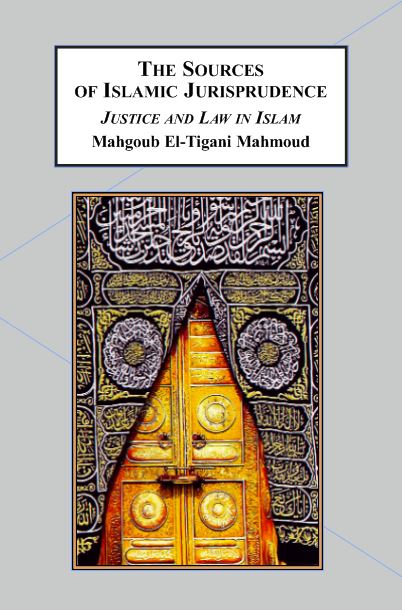Sources of Islamic Jurisprudence: Justice and Law in Islam

| Author: | Mahmoud, Mahgoub | |
| Year: | 2013 | |
| Pages: | 436 | |
| ISBN: | 0-7734-4481-5 978-0-7734-4481-2 | |
| Price: | $259.95 + shipping | |
| (Click the PayPal button to buy) | ||
Islamic jurisprudence and its sources are brilliantly explained in this compelling and instructive book. The reader comes away with a clearer sense of the meaning of Shari’a principles and jihad, and how social justice theories translate into practical actions and practical reality in today’s global community.
Reviews
“Dr. Mahmoud is at his best when exploring how Muslims implement their principles of justice.”
-Prof. Lewis V. Baldwin,
Vanderbilt University
“This is ground breaking work, in terms of its moral and ethical philosophy is carefully drawn from the sacred book of Islam, the Holy Qur’an, and brilliantly analyzed by Dr. Mahmoud.”
Prof. Wosene Yefru,
Tennessee State University
“The struggle for democracy and justice remains central to the future of Islam…this work could contribute significantly to this debate in favor of greater tolerance, greater freedom, and peace, as well as for the texts and traditions of Islamic law.”
-Dave Peterson, Director
National Endowment for Democracy
-Prof. Lewis V. Baldwin,
Vanderbilt University
“This is ground breaking work, in terms of its moral and ethical philosophy is carefully drawn from the sacred book of Islam, the Holy Qur’an, and brilliantly analyzed by Dr. Mahmoud.”
Prof. Wosene Yefru,
Tennessee State University
“The struggle for democracy and justice remains central to the future of Islam…this work could contribute significantly to this debate in favor of greater tolerance, greater freedom, and peace, as well as for the texts and traditions of Islamic law.”
-Dave Peterson, Director
National Endowment for Democracy
Table of Contents
Commendatory preface by Professor Lewis Baldwin
Acknowledgements
Introduction: Justice and Law
Intellectual Approach to the Muslim World
Approaching International Norms
This Brief Encyclopedia
Research methodology
Expected Achievements
Was there a Judicial System in Islam
Deep Intellectual Dialogue
The Roots of the Conflict
The Shiite perspective
Fundamental Differences
The Law in Western Theory
Application of Shari’a Law
Chapter One: The Sources of Islamic Jurisprudence
The Establishment and Growth of Jurisprudence
Doctrinal Developments
The Origins of Madhahib Jurist Schools
Medieval Divisions and Greek Influence
The Systematic Growth of Madhahib
The Shiite Imamiya and Sunni Madhahib
The Fiqh Jurisprudence and Philosophy
Interpretation by Tafsir and Ta’weel
The Muwafaqat principles
Status of the Mind
The Mu’tazilite Mind
The Religious Dialectics
Chapter Two: Ijtihad,
Epistemological Theories, and Practical Rules
The Holy Qur’an
The Sufi Thought
The Khilaf between Religion and Sufism
The prophet’s Sunna
Ijtihad
‘Umar’s Ijtihad
Who is a Mujtahid
The Ijma’
Qiyas
al-Masalih al Mursala, Istishab, and Zari’a
Contradicting Evidence
Revivalism in Contemporary Ijtihad
The Republican Thought
The Progressive Muslim: An Emerging Model
Concluding Remarks
Chapter Three: The Politics of Islamic Justice
Theoretical Complexities
Western Theology and Muslim Philosophy
Critique of Western Perspectives
Political Islam
The Shari’a principles of Jihad
Political Conservatism
Critique of the Islamic State
Old Jihad in New Garbs:
The Caliphate and the Shura
Critique of the Islamic Caliphate
The Shiite Perspective
A Contemporary Vision
Islam and International Relations
Conclusions
Appendices
Appendix I: President Barack Obama’s Speech to the Muslim World from Cairo, Egypt 2009
Appendix II: Speech by prime Minister Mahathir bin Mohamad, 2003
Bibliography
Name Index
Subject Index
Acknowledgements
Introduction: Justice and Law
Intellectual Approach to the Muslim World
Approaching International Norms
This Brief Encyclopedia
Research methodology
Expected Achievements
Was there a Judicial System in Islam
Deep Intellectual Dialogue
The Roots of the Conflict
The Shiite perspective
Fundamental Differences
The Law in Western Theory
Application of Shari’a Law
Chapter One: The Sources of Islamic Jurisprudence
The Establishment and Growth of Jurisprudence
Doctrinal Developments
The Origins of Madhahib Jurist Schools
Medieval Divisions and Greek Influence
The Systematic Growth of Madhahib
The Shiite Imamiya and Sunni Madhahib
The Fiqh Jurisprudence and Philosophy
Interpretation by Tafsir and Ta’weel
The Muwafaqat principles
Status of the Mind
The Mu’tazilite Mind
The Religious Dialectics
Chapter Two: Ijtihad,
Epistemological Theories, and Practical Rules
The Holy Qur’an
The Sufi Thought
The Khilaf between Religion and Sufism
The prophet’s Sunna
Ijtihad
‘Umar’s Ijtihad
Who is a Mujtahid
The Ijma’
Qiyas
al-Masalih al Mursala, Istishab, and Zari’a
Contradicting Evidence
Revivalism in Contemporary Ijtihad
The Republican Thought
The Progressive Muslim: An Emerging Model
Concluding Remarks
Chapter Three: The Politics of Islamic Justice
Theoretical Complexities
Western Theology and Muslim Philosophy
Critique of Western Perspectives
Political Islam
The Shari’a principles of Jihad
Political Conservatism
Critique of the Islamic State
Old Jihad in New Garbs:
The Caliphate and the Shura
Critique of the Islamic Caliphate
The Shiite Perspective
A Contemporary Vision
Islam and International Relations
Conclusions
Appendices
Appendix I: President Barack Obama’s Speech to the Muslim World from Cairo, Egypt 2009
Appendix II: Speech by prime Minister Mahathir bin Mohamad, 2003
Bibliography
Name Index
Subject Index
Other Islamic Studies Books
2008 - Impact of Religious Factors on Educational Change in Iran: Islam in Policy and Islam in Practice
>> See all our Islamic Studies booksMore Books by this Author
2005 - Human Rights in Africa
